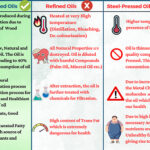Know your oils for a fresh start to a healthier heart and avoid items made with reheated/re-used cooking oil. Trans-fatty acids (TFA) is one of the most harmful kind of fats and a primary cause of heart disease and strokes globally. Typically derived from two sources – partially hydrogenated vegetable oil (Industrial TFA) and from animals, evidence shows that both types adversely affect blood cholesterol profile, thereby increasing the risk of heart problems.
Taking into cognizance the serious impact of trans-fat on heart health, the Food Safety and Standards Authority of India (FSSAI) has recently launched the Eat Right Movement to make consumers aware of the pitfalls of consumer foods with high levels of trans-fat. They are also working with stakeholders to eliminate industrially generated TFA from the Indian food system by 2022, a year ahead of the World Health Organization’s target for the world to be TFA-free.


According to Dr Rajni Chopra, Assistant Professor, Teacher-in-Charge, Department of Food & Nutrition and Food Technology, Institute of Home Economics, University of Delhi, “Rich in good fats, most vegetable oils are a heart-healthy bet. Plant based vegetable oils provide the right nutrients to maintain optimum functioning at the cellular level. Replacing saturated fats with an unsaturated option has extraordinary health benefits.” Citing examples of healthy options to keep trans-fat at bay, she further adds, “replacing butter (saturated fat) with sunflower oil (unsaturated fat), reduces bad cholesterol levels in the blood and minimizes the risk of heart disease and stroke. Moreover, majority vegetable oils in India are fortified with vitamins, including Vitamin A &D, which are essential for enhancing overall health and well-being.”
Know your oils for a fresh start to healthier heart. Trans-fats can also enter our diet through snacks like pizzas, burgers, french fries, mathris, etc. A Harvard University-backed EAT Lancet report released earlier this year identified a ‘Planetary Health Diet’ that stated that total consumption of oils & fats should be restricted to about 10 teaspoons/day which includes visible fat from home cooked food and invisible fat from local eateries and packaged food. As per the report, more than half this allowance, needs to be sourced from variety of unsaturated fats/oils provided by vegetable sources.
Vegetable oils such as mustard seed oil, peanut oil, sunflower oil, and coconut oil have traditionally been part of our everyday diet across cultures. We often underestimate the benefits associated with such locally produced oils. When eating out, understand the way food has been prepared and avoid items made with reheated/re-used cooking oil (samosa, kachori, cutlets, spring rolls, deep-fried dim sums, fries etc.). Reusing oil for frying, a common street food practice, can increase the trans-fat content of fried products. One must exercise the same caution when it comes to savoury snack items (e.g. bhujjia, namkeen) and bakery goods (cake puffs, khaari, and naankhatai).
As conscious consumers, switching to a healthier alternative is easy. Take a minute from your hurried shopping routines to read the ingredients of the products you purchase and prioritize products that are healthier for your heart.


Dr Anuja Agarwal. M.Sc (RD), Sr. Dietitian (Pediatrics)
Department of Pediatrics, AIIMS











